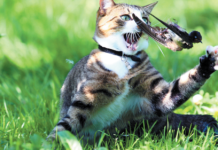Why, oh why, does loud purring have to occur at 1 A.M. just when I fall asleep? Why can’t my cat just purr at dinnertime or during evening TV-sofa time? Purring is that unusual vibration that is produced by nerve stimulation to the voice box muscles and the diaphragm (that sheet of muscle that separates your organs in your chest from your abdomen). The frequency and pattern of purring occurs between 25 and 150 hertz. so it can be loud enough to wake you up when Max is sleeping on our head. Purring can occur during both inspiration and expiration and may look like your cat is breathing harder than usual. The cause and exact mechanism of purring still seem to elude even the smartest scientists and veterinarians (cats would be happy to tell you that they are smarter than humans). While purring doesn’t seem to have any evolutionary purpose, I suspect that cats purr for the functional reason of bonding with their loved ones (i.e., you or their kittens). Cats mostly purr when they are comfortable and enjoying human contact, while mother cats may purr during nursing. The rare cat may purr when stressed or really sick (i.e., going to the veterinary clinic), so don’t always interpret it as a sign of happiness.
Not sure if your cat is purring or having difficulty breathing? It’s important to know the difference, especially if you are the owner of a cat with asthma or heart problems. When in doubt, double-check by putting your hand alongside your cat’s chest. If you don’t feel vibrations, your cat may have difficulty breathing, and this should prompt an immediate veterinary visit. If you do feel vibrations, and your cat looks content sleeping on your pillow after a nice Fancy Feast snack, then this is probably normal. I’m happy-to-be-hear-my-human purring. You should be flattered that your cat is satisfied in your presence.
To learn more about your cat’s behavior, purchase It’s A Cat’s World…You Just Live In It from Catnip today.



